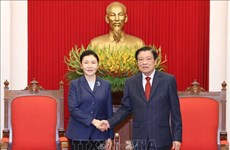Vietnam, Hungary move to enhance ties
A recent Hungary visit of a delegation led by Deputy Foreign Minister
Bui Thanh Son has produced positive outcomes and set tasks for the two
countries to further their multifaceted collaboration.
A recent Hungary visit of a delegation led by Deputy Foreign Minister
Bui Thanh Son has produced positive outcomes and set tasks for the two
countries to further their multifaceted collaboration.
Developing the 65-year relations with Vietnam (1950-2015) is a priority in Hungary’s Look East policy, Hungarian officials declared during working sessions with the Vietnamese delegation.
They said Hungary lauded Vietnam’s innovation progress with a belief that the nation will see a higher growth rate this year thanks to its effective macroeconomic policies.
The central European country agreed to strengthen its coordination with Vietnam at international forums, especially within the frameworks of the United Nations and the Asia-Europe Meeting.
Both sides concurred that their trade engagements hold great potentials to thrive and they will work together to implement cooperative plans set at the March session of their joint economic committee.
In 2014, Vietnam and Hungary earned 176 million USD in trade revenue, an annual rise of 19 percent.
The two will step up mutually-beneficial ties in a number of sectors, including higher education, water resources management, health care, agriculture and personnel training for nuclear-power plants. In particularly, they agreed to accelerate the implementation of projects in Vietnam funded by Hungarian preferential credit, such as the construction of the Can Tho Oncology Hospital.
Hungary took the occasion to express appreciation of the role of the Vietnamese expatriate community in promoting trade-investment ties between the two countries.
Hungarian Foreign Minister Szijjarto affirmed that his nation supports the early conclusion of negotiations and signing of the Vietnam-European Union free trade agreement, which he said will help stimulate investment and commercial activities between Hungary and Vietnam.
Concerning the East Sea issue, the Hungarian side supported the peaceful approach of Vietnam and the ASEAN to settle disputes in conformity with international law, especially the 1982 UN Convention on the Law of the Sea and the Code of Conduct in the East Sea.-VNA
Developing the 65-year relations with Vietnam (1950-2015) is a priority in Hungary’s Look East policy, Hungarian officials declared during working sessions with the Vietnamese delegation.
They said Hungary lauded Vietnam’s innovation progress with a belief that the nation will see a higher growth rate this year thanks to its effective macroeconomic policies.
The central European country agreed to strengthen its coordination with Vietnam at international forums, especially within the frameworks of the United Nations and the Asia-Europe Meeting.
Both sides concurred that their trade engagements hold great potentials to thrive and they will work together to implement cooperative plans set at the March session of their joint economic committee.
In 2014, Vietnam and Hungary earned 176 million USD in trade revenue, an annual rise of 19 percent.
The two will step up mutually-beneficial ties in a number of sectors, including higher education, water resources management, health care, agriculture and personnel training for nuclear-power plants. In particularly, they agreed to accelerate the implementation of projects in Vietnam funded by Hungarian preferential credit, such as the construction of the Can Tho Oncology Hospital.
Hungary took the occasion to express appreciation of the role of the Vietnamese expatriate community in promoting trade-investment ties between the two countries.
Hungarian Foreign Minister Szijjarto affirmed that his nation supports the early conclusion of negotiations and signing of the Vietnam-European Union free trade agreement, which he said will help stimulate investment and commercial activities between Hungary and Vietnam.
Concerning the East Sea issue, the Hungarian side supported the peaceful approach of Vietnam and the ASEAN to settle disputes in conformity with international law, especially the 1982 UN Convention on the Law of the Sea and the Code of Conduct in the East Sea.-VNA













